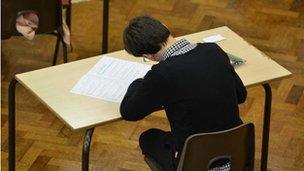Ofsted chief voices fears for brightest pupils
- Published
- comments

Sir Michael urged comprehensive schools to learn from the independent and selective sectors
England's chief inspector of schools, Sir Michael Wilshaw, has ordered a "landmark report" into how state schools teach the most able students.
Ofsted's head warned some pupils, who got top marks at primary school, were not doing as well at secondary school.
Such students ought to be pushed, as they would be at independent or grammar schools, he told the Sunday Telegraph., external.
The news comes as league tables reveal hundreds of schools failed to produce pupils suitable for elite universities.
The tables, released on Thursday, showed almost a quarter of England's sixth forms and colleges had no pupils with the top A-level grades sought by leading institutions.
'Nonsense'
Setting out a "rapid response" to the data, Sir Michael promised the watchdog's survey would investigate fears that some of the brightest secondary school pupils are being let down by teachers who fail to stretch them to get the best exam results.
Many are left to coast in mixed ability classes, or entered too early for GCSE exams in order to gain the minimum C grades required for league tables, he warned.
He also said the report - to be published in the spring - would address the "nonsense" that a tiny number of independent schools were sending more youngsters to Oxford and Cambridge than thousands of state secondary schools.
England's comprehensive schools would have to learn lessons from the independent and selective sectors, he said.
The new report is due to be carried out over the coming months by Ofsted inspectors visiting a sample of more than 50 secondary schools, looking at statistics on gifted and talented provision and pupil progression, according to Sir Michael.
"I am passionate about this, it will be a landmark report.
"I am as concerned as the next person on the issue of social mobility. Are our children and our children from the poorest backgrounds who are naturally bright doing as well as they should?"
Leading universities have been urged in recent years to do more to recruit bright students from a wider set of backgrounds.
But data released this week shows that many schools are not producing students of a high enough calibre to automatically get places at such universities.
League tables - drawn from the latest official government figures on pupils' academic achievement - have shown some 594 (23.4%) of the 2,540 schools teaching A-levels had no pupils with the two As and a B in the subjects recommended for the best degree courses.
- Published24 January 2013
- Published15 November 2012
- Published13 November 2012
- Published21 August 2012
- Published7 December 2012